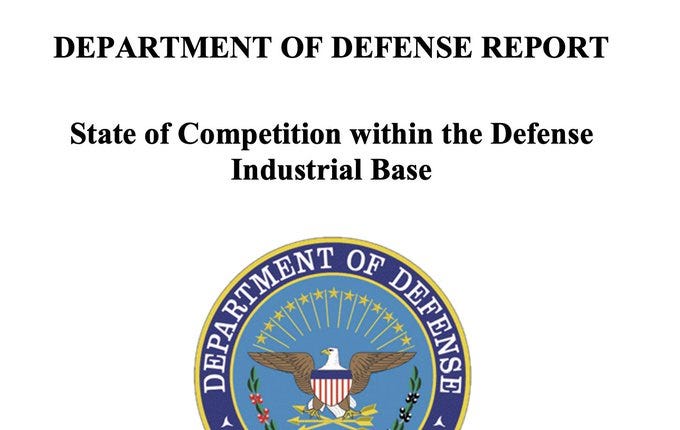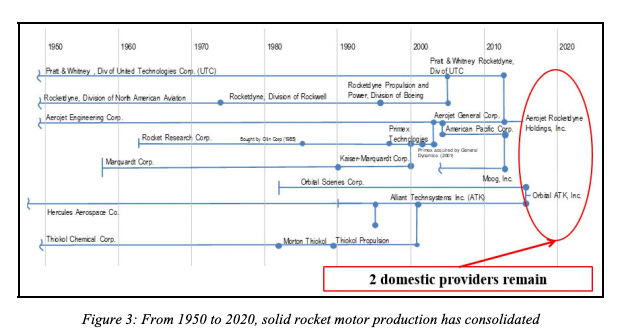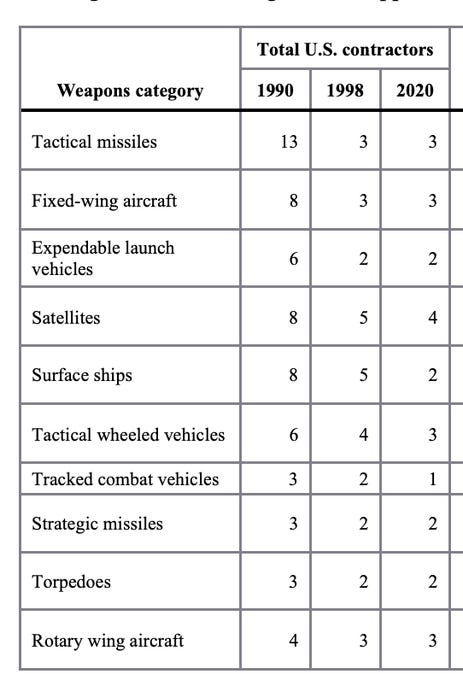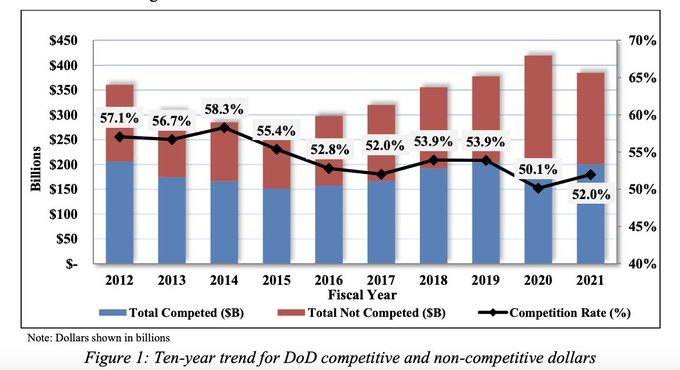The Pentagon Knifes Wall Street
A new report shows that defense officials are taking market power seriously.
A few years ago, I had a conversation with Admiral William McRaven, one of the endless number of ramrod straight fancy military leaders who have actively bad ideas about economics. I asked him about monopolies in the defense base, and he said that he agreed they were bad, but that wasn’t anything the Pentagon could affect. The Pentagon, I offered, is the biggest buyer of stuff in the entire world, and the DOD had facilitated a merger boom in the 1990s. Of course it structures the defense industry. He agreed, but was sort of annoyed, and then mentioned something about free markets before walking off. War is politics by other means, he was probably taught, but the market, you see, that’s sacrosanct.
I mention this encounter because an important paper that just came out of the Pentagon on consolidation in the defense base last week. McRaven’s attitude has very much ruled the roost since the 1990s, in sync with the broader influence of Milton Friedman and the baby boomer mode of thinking about economics. Even today, big tech is making the argument that national security concerns should block antitrust action (despite the obvious problem that TikTok is only dominant today because Facebook killed its domestic rivals and then helped elevate the Chinese firm’s products in the U.S. as a favor to the Chinese government.)
But over the past few years, inside and outside of the DOD, the defense establishment has become more aware that monopoly power is a problem that the Pentagon can and should actively affect. Internal reports have been noting significant problems with sole source contracting for years, and members of Congress like Ro Khanna and Senators Elizabeth Warren and Richard Blumenthal have been pushing from relevant Congressional committees.
The typical excuse is ‘oh we need to make it easier for small firms to sell to the Pentagon,’ usually prompted by the big defense contractors who use that line to shift procurement rules even more in their favor. The report issued this week, however, is very clear about the roots of Pentagon’s monopoly problem. The issue is mergers. Here, for instance, is a chart the DOD included in its report, on the consolidation of the rocket motor production industry.
During the Cold War, the U.S. built a stream of effective weapons domestically, and kept a lid on defense contractor profits. But that changed under Bill Clinton, whose defense officials rewrote contracting laws and actively encouraged and even financed consolidation. "Since the 1990s, the defense sector has consolidated substantially,” noted this report, “transitioning from 51 to 5 aerospace and defense prime contractors.” Tactical missile suppliers have declined from 13 to 3, fixed-wing aircraft suppliers declined from 8 to 3, satellite suppliers have halved from 8 to 4, and today, 90% of missiles come from 3 sources. You can see that 1990s acceleration of mergers in the charts above, and below.
Fewer and fewer contracts are seeing any competition at all.
Consolidation not only drives higher prices, but also poses "mission risk" and "in cases where the existing dominant supplier or suppliers are influenced by an adversary nation, pose significant national security risks." Those are fighting words. Back in July, the Biden administration issued an executive order on competition policy across government, and the Pentagon was a big part of it. That’s where this report comes from.
This change is a long time coming. External chatter has been significant. Marine and arms control negotiator Lucas Kunce and I wrote a piece that went viral in 2019 in The American Conservative, on how consolidation harms national security. That same year, Marine logistics officer Elle Ekman drew a lot of attention with a New York Times piece discussing the problems of right to repair in the military. By 2021, Biden’s nominee for the number two slot at the Pentagon, Kathleen Hicks, expressed concern over ‘extreme consolidation’ in the defense base.
The report isn’t just another document, it represents a real policy change. The Pentagon’s defense contractor problem was highlighted a few years by the monopolization of America’s nuclear triad by Northrop Grumman’s acquisition of rocket engine maker Orbital-ATK, which ended up pushing Boeing out of the bidding war for the upgrade of our ICBM nuclear arsenal. Now Northrop is a sole source contractor for a set of important systems that will cost hundreds of billions of dollars. That merger, which the Trump Pentagon allowed in 2018, was such a disaster that it prompted Elizabeth Warren to push for blocking a similar deal between Lockheed and Aerojet. It is also included in the report as an example of the dangers of consolidation.
Warren’s words carried weight. The Federal Trade Commission, which had cleared the Northrop-Orbital deal, this time put its foot down. And so did the Pentagon. The deal blew up, and a lot of traders on Wall Street who had bet on the merger going through lost a lot of money. In other words, there’s some actual buy-in at the DOD, both at a political and staff level, for challenging consolidation. Contractors still have massive power, but this report and the merger challenge to Lockheed-Aerojet is a real change from thirty years of destructive policy. More and more CEOs are going to think twice before trying to buy rivals, suppliers, or customers.
Thanks for reading. And as always, send me your thoughts or leave a comment.
cheers,
Matt






Bill Clinton mentioned AGAIN! He’s behind nearly every bad deregulatory decision whose chickens are only now coming home to roost - Glass-Steagall, Telecommunications Act, Ocean Shipping Reform, and now this.
The DOD also builds gyms, orders toilets, builds ATM’s, buys uniforms, food etc. not as much money but worth a closer look. . Guessing that many services have fewer or only 1-2 bidders also.